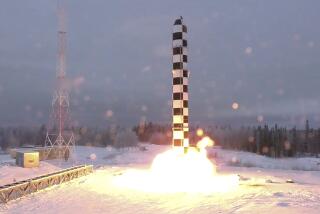Soviet Envoy Sees ‘Chaotic Arms Competition’ if SALT Is Scrapped
- Share via
WASHINGTON — A Soviet diplomat said Friday that “a chaotic arms competition might ensue” if the unratified second strategic arms limitation treaty limits are violated and warned that the demise of the pact will affect chances for a superpower summit “in the most negative way.”
Oleg M. Sokolov, deputy chief of the Soviet Embassy, urged President Reagan to drop plans to exceed the treaty limits because of alleged Soviet violations.
But the President, at a luncheon with reporters, said, “There is no way that we could or should possibly go on unilaterally adhering to this treaty.”
Sokolov, in remarks made at an embassy news conference before the President’s luncheon, said that if the United States exceeds the limits on nuclear warheads or launchers, the Soviet Union will not be bound by the SALT II pact and will act to preserve “strategic parity.” He said the Soviet response will be “proportionate,” but he would not elaborate.
“Should the current arms control regime be allowed to disintegrate, a chaotic arms competition might ensue,” Sokolov said at an embassy news conference. “The Soviet Union would not be able to remain a passive onlooker.
“When the United States breaks out of those agreements,” Sokolov said, “all the limitations provided for in them will become invalid, such as the limitation on the number of the strategic delivery vehicles, the number of warheads on them.”
Sokolov also told reporters the effect of Reagan’s plan to ignore the treaty’s ceiling on B-52 bombers armed with cruise missiles unless there is a radical change in Soviet treaty practices will ripple across the full range of U.S.-Soviet relations, including the arms control talks and “in particular” the chance for a superpower summit in the United States this year.
He said that should Reagan reverse his decision, “It certainly enhances the prospect, not only for relations in general, but for the summit meeting in particular.
“The actual abandonment and actual technical and physical withdrawal of the United States from SALT II would affect the situation in the most serious, negative way,” he said.
“What we have to do is preserve the existing foundations for the arms control regime rather than destroy them,” he said.
Reagan has repeatedly accused the Soviets of violating the treaty negotiated between President Carter and President Leonid I. Brezhnev in 1979. The Kremlin has denied any violations.
Reagan had pledged not to undercut the treaty--withdrawn from the Senate by Carter after the Soviet invasion of Afghanistan doomed its chances--as long as the Soviets respected it.
But that changed May 27 with a warning that upset the Kremlin, U.S. allies and arms control advocates in Congress. Reagan said he would base future compliance with the agreement on the basis of how the Soviets respect it and on progress in the Geneva arms talks.
Secretary of State George P. Shultz took exception Friday with newspaper headlines that said the agreement is “dead.”
“What the President is seeking is a regime of mutual restraint that looks at what they do and places what we do alongside of it,” said Shultz. “We’re definitely not talking about an escalation, an arms race; quite to the contrary.”
Shultz also said recent Soviet arms control proposals have substance and the fact they were made privately is a good sign.
More to Read
Sign up for Essential California
The most important California stories and recommendations in your inbox every morning.
You may occasionally receive promotional content from the Los Angeles Times.













